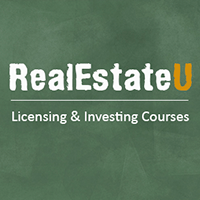If you want to learn how to make money in real estate, go to your nearest McDonalds.
Yes, the fries are more addictive than heroin, but you may be surprised to learn that the land they’re made on is far more important to the company than their french fry recipe. In fact, real estate is such a crucial part of McDonald’s bottom line that founder Ray Kroc famously quipped that he was in the real estate business, not the burger business.
In order to get you inspired enough to start your own real estate empire sans amazing french fries, we interviewed 25 CEOs, investors, brokers, and tech gurus to see how they are making money in real estate. If you want to borrow from their wisdom, read on.
Than Merrill, CEO and Founder of FortuneBuilders and Star of A&E’s Flip This House
Fixing and flipping houses is an excellent short-term real estate investment strategy. In order to make money, house flippers search for undervalued homes that need renovation, then renovate and sell those homes for a profit. Of course, successfully flipping houses isn’t exactly simple. Click here for our ultimate guide on How to Make Money Flipping Houses.
Kenny Truong (aka #FASTAGENT), Realtor, Climb Real Estate
Kenny Truong went from a total real estate beginner to one of the most successful buyer’s agents in Oakland without a strong sphere of influence to get this first clients from. How did he do it? Easy. In addition to being a killer salesperson, Kenny used viral advertising on Twitter and Facebook, Zillow Premier Agent, and a fun but information rich email marketing campaign.
So how do you go from just starting to think about a career in real estate to being ready to launch an advertising campaign? FitSmallBusiness is partnering with Career WebSchool to offer online real estate courses. These self-paced courses walk you through getting and keeping your real estate license on your own time. Click here to check it out.
David John Marrotta, President, Marrotta Wealth Management
Real estate investment trusts are firms that own, manage, or otherwise represent real estate (usually large) portfolios. Investing in an REIT can be a great way to invest in the real estate market with relatively fewer risks. Here’s David John Marrotta on the ROI of REITs in Forbes.
“While bonds appreciate on average 3% over inflation and stocks appreciate about 6.5% over inflation, real estate falls between these two. Residential real estate investments appreciate about 4.1% over inflation and commercial real estate investments appreciates about 4.9% over inflation.
They also have a lower volatility than U.S. stocks. The lower volatility and low correlation together means that REITs find a place in the efficient frontier of investing when you are crafting your investment plan.”
Andrew McConnell, CEO, Rented.com
Love them or hate them, sharing economy startups like Airbnb are here to stay. As a result, tech savvy real estate investors have been clamoring for opportunities to invest in short term rentals. Andrew McConnell, CEO of short term property management resource Rented.com explains the allure:
“The rise of Airbnb and VRBO in recent years has created a tremendous real estate investment opportunity for those who have been paying attention. As travelers increasingly prefer “alternative accommodation” options to hotels, the rental demand for such properties increases. This increased demand leads both to greater occupancy and to higher nightly rates. With Rented.com’s recent Short-Term Rental Income Report we have seen a number of markets where on average you can expect a double digit cap rate, with individual opportunities far exceeding even that.”
In order to find a great short term rental property to invest in, focus your search in areas with high demand for short term rentals. This means cities like New York and San Francisco, college towns, or areas popular with vacationers.
Stacy Galan Schailendra, Atlanta Real Estate Professional, Sotheby’s International Realty
With all the tech tools vying for an agent’s marketing dollars these days, many realtors forget the core skill any good salesperson needs: how to build and maintain relationships.
Though she uses cutting edge real estate marketing software and makes extensive use of Zillow Premier Agent, Stacy attributes much of her staggering success in real estate to one of the oldest tricks in the book: cold calling expired and FSBO leads.
We wholeheartedly agree. After all, all of the software in the world won’t help you make money if you don’t take the time to learn how to generate, nurture, and close leads. If you want leads to work with right away, check out Zillow Premier Agent.
Dave Van Horn, President, PPR The Note Co
Non-performing notes are mortgages that borrowers are behind on. Instead of foreclosing on the property and selling the home, lenders instead sometimes sell the non-performing mortgages to investors at a deep discount.
There can be a great deal of financial risk investing in non performing notes, so proceed cautiously. Lengthy legal battles to foreclose and get a clear title can cost investors tens of thousands in legal fees.
David Wieland, CEO, Realized1031.com
Let’s face it, being a landlord can be hard work. Fixing your tenant’s toilet on a Saturday night isn’t for everybody. If you want to trade your rental property for an investment that doesn’t require a plunger, you should consider a 1031 exchange. Here’s how they work:
Section 1031 of the IRS code allows real estate investors to sell investment properties in exchange for a “like-kind” property of equal or greater value. For example, you could sell your two family rental and co-invest in say, a shopping center or office building. Sure, this doesn’t sound that exciting until you learn that under a 1031 exchange, you won’t pay a dime in capital gains tax.
Realized1031.com allows you to co invest in turn key commercial properties that can give you a great ROI without the midnight calls to fix toilets. Their investments range from retail and office buildings, to a $40 million apartment complex in Florida.
Scott Williams, Founder, REtipster.com
Wholesaling houses is one of the only ways to invest in real estate without a ton of capital. Here’s how it works. Real estate or investing professionals find homes that are undervalued, then put them under contract. They add contingencies to the contract that stipulate they will assign the contract to another buyer within a certain (usually very short) amount of time. They then work to find a buyer who is willing to pay slightly more than the price they are under contract for and assign the contract to them, keeping the difference as a profit at closing.
While wholesaling can be a great way to raise capital for other real estate investments, it should be noted that in certain states, this activity may be considered acting as a real estate agent, requiring a license. The law here can get rather byzantine, so be sure to research the fine print on how your state classifies these transactions before even thinking about wholesaling.
If it turns you you do need a real estate license, we have an in-depth guide on how to get one here.
Tamir Poleg, CEO, tech powered brokerage Real
After working successfully as a real estate agent, the next logical step to grow your business is to become a real estate broker. As a broker you can hire agents to work under your license. You can then take up to half of that agent’s commissions as income for your brokerage.
In order to start a successful brokerage, you need to be a licensed real estate broker (or partner with one), and then recruit real estate agents to work for you. To make a compelling offer, you should be able to give new agents the training, real estate software, and tech support they need to thrive.
One of the best parts of all the innovative software available to agents today is that many agents don’t even need or want an office anymore. That means, you don’t even need to lease expensive office space to start a brokerage today. Tech powered brokerage Real for example, are able to generate leads for their agents online and offer an 85% split because they don’t have to pay an expensive office lease.
Kurt Westfield, Founder and President, WC Companies
Multifamily redevelopment means representing multifamily owners in their capital and apartment redevelopment projects. Multifamily redevelopment requires skills in finance, management and construction.
“The multifamily platform has allowed for capitalization rates of 7-12% in well-performing markets and continues to be one of the strongest asset classes in commercial real estate, due to a recovering housing market, excellent rent growth driven by Millennials, and favorable consideration by both small/local and institutional investors.”
If you want to learn how to finance your own multifamily projects, check out our in-depth guide to multifamily financing here.
Emile L’Eplattenier, Real Estate Marketing and Sales Analyst, FitSmallBusiness.com
If you live in a city with a low vacancy rate and high demand, you can quickly and easily make money renting apartments.
While representing tenants can be lucrative, the real money is made representing management companies and small landlords. If you have an exclusive listing in New York City, you can charge clients up to 15% of the year’s rent as a commission. Considering the average one bedroom in Manhattan is over $3250, you can do very well with a small number of clients. Best of all, the deal cycle is measured in days instead of months.
If you don’t live in a major city, you can always find landlords and sign exclusive right to rent contracts to keep their units occupied. This is handled by property managers most of the time, but as a trained sales professional, you have a great value add.
Connie Rankin, LEED, AP, President of Customized Real Estate Services
Let’s face it, with the rise of so many startups, the demand for office and commercial space is only going up. Leasing commercial real estate can be far more lucrative than leasing apartments. The rationale here is simple. Since commercial leases are often 5 years or longer, commissions in commercial real estate are often much, much higher than in residential real estate. You can even negotiate to be paid a portion of a business’s profits as your commission.
In order to succeed in commercial real estate though, you need to be tough. Competition is fierce, so you should be able to actively pursue deals and not be afraid to knock on doors to get clients.
Zurple
A new crop of software companies is working solely on generating leads for real estate agents. To greatly simplify how this works, these companies put up advertisements that leads interact with and provide their contact information. They then reroute these leads directly to real estate agents and brokerages. Companies like Zurple also offer agents software to respond and track their progress with these leads.
Dan Stewart, CEO, Happy Grasshoper
Lead nurturing is the only way to stay top of mind with leads that aren’t ready to buy or sell. Personal connections via text or email is effective, but it’s also something that many realtors struggle with. Services like Happy Grasshopper help fill in the gaps to help realtors stay top of mind and close more deals. Here’s Dan’s take on why they’ve seen so much success.
“Phrases like ‘the fortune is in the follow up’ and ‘your database is your business’ are well known, but few agents fully capitalize on the value of their CRMs. Happy Grasshopper fixes that by regularly starting conversations with the right segments of your database. Our professional writers create and deliver engaging messages that help you generate more referrals, convert more leads, and attract the right recruits. It starts at just $59/month.“
Bruce Ailion, Real Estate Broker and Attorney
In an expanding economy there is always a strong demand for commercial real estate. As with residential sales, being on the sell side is far preferable. That said, because you’re often dealing with corporate entities instead of individuals, the commercial real estate industry can be cut throat.
“Commercial brokerage is the place for ultra high income. Success here means $250-750K annually, and top producers regularly make $1M a year or more. This area is not for everyone though. It’s a high stakes, high risk, high reward business. This year, I worked on a transaction for six months, invested $15,000 in hard costs, and one of the parties backed out the week the transaction was to be consummated. $90,000 in commissions went out the window.”
Chike Uzoka, Founder, Valentine Property Holdings
Since more people have been choosing to rent instead of own in the past few years, the interest in rental properties has skyrocketed. The rental market is so strong, that even large foreign investment firms have been snapping up rental properties in US cities by the hundreds.
That means that the market for property management has never been better and may be a lucrative area to get involved in. Here’s Chike’s take on the value add great property managers offer for owners:
“Without the right property management, any property – whether a multi-unit residential, retail, or commercial building – is not being run efficiently. Good property management companies fix problems when they arise; great property management companies fix them before they happen.”
Once you start managing properties, you’re going to want to get great property management software. Check out our in-depth comparison between Buildium, Appfolio, and Propertyware here.
Matt Humphrey, CEO, LendingHome
Crowdfunding allows individual investors to pool their money and invest directly in real estate. The properties available for crowdfunding investors to invest in include everything from individual fix and flip projects to huge new commercial developments. Here’s Matt’s take on why investing in real estate through crowdfunding can yield great returns in 2016:
“There’s never been a better time to invest in real estate via crowdfunding and marketplace lenders. Renovating residential properties for resale in particular can be a lucrative opportunity as home flip activity reaches a six-year high. LendingHome’s fix and flip borrowers typically net an average gross profit of $50-60k for dramatically improving the housing stock. And our investors get access to high-quality, high-performing real estate assets with average yields of around 10 percent.”
Emmanuelle Johaadien, CEO, Foreignexchange.com
A vacation property is probably the most enjoyable way to make money in real estate. Not only can you earn income from rentals, but you never have to rent a hotel room again! Here’s Emmanuelle’s take on the benefits of vacation properties:
“If you are looking to make money in real estate, purchasing a vacation home can be an excellent long-term investment. A vacation property is unique because it can be used for personal enjoyment and rented out to tourists.
Homes in popular vacation destinations tend to appreciate in value more than properties in other locations. It’s important to do your due diligence on the local area, and make sure you know the ownership expenses and maintenance costs you will face. However, a vacation home can be a tremendous source of passive income as well as an enjoyable place for you and your family to visit.”
Welmoed Sisson, Licensed Home Inspector, Co-Founder, Inspections By Bob
A great home inspector is basically a superhero for anyone trying to buy a home. A few hundred dollars spent hiring one can save you endless headaches and a suitcase full of money.
It’s also a great career for people with construction knowledge who want to own their own real estate business. In a rising market, home inspectors can command premium rates.
If you want to learn what it takes to become a licensed home inspector, check out our step-by-step guide here.
Dustin Harris, Founder, theappraisercoach.com
Since real estate appraisal can be a difficult career to break into, the number of appraisers in the US has fallen sharply over the past decade. That means that opportunities for new appraisers who are willing to go through the process of becoming a licensed appraiser are on the increase.
If you want to get ahead in the appraisal industry, appraiser Coach Dustin Harris recommends getting creative to find appraisers willing to mentor you.
“What do you bring to the table in addition to the desire to become an appraiser? Do you have a background in web design? Perhaps you can commit to revamping and maintaining your mentor’s business website. There is a lot of non-lender appraisal work to be had, but most appraisers do not have time to pursue it. What appraiser would not be willing to bring on a trainee who promised to bring them additional, less-frustrating work?”
Danny Johnson, Real Estate Investor and Founder, Flippingjunkie.com
A bank owned or REO (Real Estate Owned) property is a property that has gone through the foreclosure process and failed to sell at the foreclosure auction. In some ways, buying REO properties can be much less risky than buying homes at foreclosure auctions. Once a property is back in the bank’s possession, the lender clears the title of any liens, evicts tenants if needed, andmight even do basic repairs to get the property in shape to be sold. Here’s Danny’s take on finding REO deals:
“The best deals for REO’s can be found from HUD. HudHomeStore.com has HUD foreclosures listed for sale with lots of information. If you are looking for a house to live in and flip, this is your best bet. You can bid on many of the houses before investors that won’t be living in the house are allowed to bid. This is a huge advantage and how I bought my first house.”
Elizabeth Weintraub, Sacramento-based Realtor
A short sale is when a lender decides to sell a home for a discounted price to release an existing mortgage. In most cases lenders pursue short sales when the borrow is in default (the step before foreclosure), but this is not the only time they might use a short sale. Sometimes the borrower might be current, but owe more money than the home is worth.
You can sometimes get great deals on short sales, but the process can be risky.
Via The Balance
If you want to learn more about investing in distressed properties like short sales, you’re going to want to know your way around a property auction. Check out our guide to buying properties at auction here.
Bob Samii, Founder, SharpLaunch
Whether you are in residential or commercial real estate, your website can have massive impact on your ability to generate leads (and your bottom line). In commercial real estate, 80% of potential tenants and investors start their search online which means that you need a site that can capture traffic and convert visitors into potential prospects. Same holds true for residential brokers, property managers and any other service providers in the real estate industry.
Your biggest marketing investment should be on your digital presence which serves as the foundation piece for marketing activities across many channels. Remember: no visits means no leads, no leads means no sales.
If you want to look at a comparison guide for top website builders for real estate check out this detailed guide.
Evan Harris, Founder, SD Equity Partners
Hard money lenders finance the sale of real estate for short term investors. Hard money lending is also an incredible way to generate wealth from real estate. Here’s Evan’s take on why it’s such a great business to be in:
“Hard money lending is a fantastic industry to break into because of the high returns and extremely low risk on the lender’s side. For real estate hard money loans, all investments are backed by physical properties. This means that the lender is collecting interest on the initial loan amount with the knowledge that even if the borrower defaults, the lender still has an asset (the property) to collect his or her return from. The worst case scenario is that you have to sell or flip a property yourself, and in that case, you earn all of the profits.
Furthermore, a great hard money lender works with his or her clients on making every real estate sale a success. Especially for fix and flip clients, happy customers come back for repeat business. After you build relationships with great ‘flippers,’ you can sit back and collect the interest without worry.”
If you want to learn more about hard money lenders, check out our in-depth guide here.
Mark Ferguson, Real Estate Investor and Founder, InvestFourMore
“Rental properties can be a great investment, because with the right property, you will make money every month after paying taxes, insurance, mortgage payments, HOA fees, as well as accounting for maintenance and vacancies. The bonus of rentals are the incredible tax advantages and possible appreciation.
One great tactic to get started in the rental property business is to buy a multifamily home as an owner-occupant. Live in one of the units for at least one year, while you rent out the other units. You can buy with less than 5 percent down as an owner-occupant, and the other units should pay for all your expenses, allowing you to live for free. Once you move out, you can rent all the units so you will be making more money every month.
Home ownership rates are at their lowest since the 1960s. That means there are more renters and fewer homeowners. This trend is expected to continue with millennials buying homes less and less. Rents have been rising higher than home prices across the country, making it a great time to invest in rentals.”
Since you’re going to want to get tenants for your rentals before the ink is even dry on your contract, check out our showdown between the top three tenant screening services here.
Ciprian Morariu, Co-founder, RealEstateU
Joe Samson, GreatCalgaryRealEstate.com
Let’s face it, launching a website is not a big deal these days. Attracting leads to your website is usually the largest hurdle that many folks can’t seem to comprehend. But with the endless options of online advertising, you can drive traffic to your landing pages almost immediately.
If you have decided to focus on increasing your digital footprint, then improving the number of leads that sign up on your website can bring a huge boost to your income.
Yes, the fries are more addictive than heroin, but you may be surprised to learn that the land they’re made on is far more important to the company than their french fry recipe. In fact, real estate is such a crucial part of McDonald’s bottom line that founder Ray Kroc famously quipped that he was in the real estate business, not the burger business.
In order to get you inspired enough to start your own real estate empire sans amazing french fries, we interviewed 25 CEOs, investors, brokers, and tech gurus to see how they are making money in real estate. If you want to borrow from their wisdom, read on.
 1. Fix and Flip Houses
1. Fix and Flip Houses
Than Merrill, CEO and Founder of FortuneBuilders and Star of A&E’s Flip This HouseFixing and flipping houses is an excellent short-term real estate investment strategy. In order to make money, house flippers search for undervalued homes that need renovation, then renovate and sell those homes for a profit. Of course, successfully flipping houses isn’t exactly simple. Click here for our ultimate guide on How to Make Money Flipping Houses.
 2. Represent Home Buyers
2. Represent Home Buyers
Kenny Truong (aka #FASTAGENT), Realtor, Climb Real EstateKenny Truong went from a total real estate beginner to one of the most successful buyer’s agents in Oakland without a strong sphere of influence to get this first clients from. How did he do it? Easy. In addition to being a killer salesperson, Kenny used viral advertising on Twitter and Facebook, Zillow Premier Agent, and a fun but information rich email marketing campaign.
So how do you go from just starting to think about a career in real estate to being ready to launch an advertising campaign? FitSmallBusiness is partnering with Career WebSchool to offer online real estate courses. These self-paced courses walk you through getting and keeping your real estate license on your own time. Click here to check it out.
 3. Invest in REITs (Real Estate Investment Trusts)
3. Invest in REITs (Real Estate Investment Trusts)
David John Marrotta, President, Marrotta Wealth ManagementReal estate investment trusts are firms that own, manage, or otherwise represent real estate (usually large) portfolios. Investing in an REIT can be a great way to invest in the real estate market with relatively fewer risks. Here’s David John Marrotta on the ROI of REITs in Forbes.
“While bonds appreciate on average 3% over inflation and stocks appreciate about 6.5% over inflation, real estate falls between these two. Residential real estate investments appreciate about 4.1% over inflation and commercial real estate investments appreciates about 4.9% over inflation.
They also have a lower volatility than U.S. stocks. The lower volatility and low correlation together means that REITs find a place in the efficient frontier of investing when you are crafting your investment plan.”
 4. Invest in Short Term Rentals
4. Invest in Short Term Rentals
Andrew McConnell, CEO, Rented.com Love them or hate them, sharing economy startups like Airbnb are here to stay. As a result, tech savvy real estate investors have been clamoring for opportunities to invest in short term rentals. Andrew McConnell, CEO of short term property management resource Rented.com explains the allure:
“The rise of Airbnb and VRBO in recent years has created a tremendous real estate investment opportunity for those who have been paying attention. As travelers increasingly prefer “alternative accommodation” options to hotels, the rental demand for such properties increases. This increased demand leads both to greater occupancy and to higher nightly rates. With Rented.com’s recent Short-Term Rental Income Report we have seen a number of markets where on average you can expect a double digit cap rate, with individual opportunities far exceeding even that.”
In order to find a great short term rental property to invest in, focus your search in areas with high demand for short term rentals. This means cities like New York and San Francisco, college towns, or areas popular with vacationers.
 5. Represent Home Sellers
5. Represent Home Sellers
Stacy Galan Schailendra, Atlanta Real Estate Professional, Sotheby’s International RealtyWith all the tech tools vying for an agent’s marketing dollars these days, many realtors forget the core skill any good salesperson needs: how to build and maintain relationships.
Though she uses cutting edge real estate marketing software and makes extensive use of Zillow Premier Agent, Stacy attributes much of her staggering success in real estate to one of the oldest tricks in the book: cold calling expired and FSBO leads.
We wholeheartedly agree. After all, all of the software in the world won’t help you make money if you don’t take the time to learn how to generate, nurture, and close leads. If you want leads to work with right away, check out Zillow Premier Agent.
 6. Invest in Non-Performing Notes
6. Invest in Non-Performing Notes
Dave Van Horn, President, PPR The Note CoNon-performing notes are mortgages that borrowers are behind on. Instead of foreclosing on the property and selling the home, lenders instead sometimes sell the non-performing mortgages to investors at a deep discount.
There can be a great deal of financial risk investing in non performing notes, so proceed cautiously. Lengthy legal battles to foreclose and get a clear title can cost investors tens of thousands in legal fees.
 7. Consider a 1031 Exchange
7. Consider a 1031 Exchange
David Wieland, CEO, Realized1031.com Let’s face it, being a landlord can be hard work. Fixing your tenant’s toilet on a Saturday night isn’t for everybody. If you want to trade your rental property for an investment that doesn’t require a plunger, you should consider a 1031 exchange. Here’s how they work:
Section 1031 of the IRS code allows real estate investors to sell investment properties in exchange for a “like-kind” property of equal or greater value. For example, you could sell your two family rental and co-invest in say, a shopping center or office building. Sure, this doesn’t sound that exciting until you learn that under a 1031 exchange, you won’t pay a dime in capital gains tax.
Realized1031.com allows you to co invest in turn key commercial properties that can give you a great ROI without the midnight calls to fix toilets. Their investments range from retail and office buildings, to a $40 million apartment complex in Florida.
 8. Invest in Wholesaling Houses
8. Invest in Wholesaling Houses
Scott Williams, Founder, REtipster.com Wholesaling houses is one of the only ways to invest in real estate without a ton of capital. Here’s how it works. Real estate or investing professionals find homes that are undervalued, then put them under contract. They add contingencies to the contract that stipulate they will assign the contract to another buyer within a certain (usually very short) amount of time. They then work to find a buyer who is willing to pay slightly more than the price they are under contract for and assign the contract to them, keeping the difference as a profit at closing.
While wholesaling can be a great way to raise capital for other real estate investments, it should be noted that in certain states, this activity may be considered acting as a real estate agent, requiring a license. The law here can get rather byzantine, so be sure to research the fine print on how your state classifies these transactions before even thinking about wholesaling.
If it turns you you do need a real estate license, we have an in-depth guide on how to get one here.
 9. Start a Real Estate Brokerage (without the office)
9. Start a Real Estate Brokerage (without the office)
Tamir Poleg, CEO, tech powered brokerage Real After working successfully as a real estate agent, the next logical step to grow your business is to become a real estate broker. As a broker you can hire agents to work under your license. You can then take up to half of that agent’s commissions as income for your brokerage.
In order to start a successful brokerage, you need to be a licensed real estate broker (or partner with one), and then recruit real estate agents to work for you. To make a compelling offer, you should be able to give new agents the training, real estate software, and tech support they need to thrive.
One of the best parts of all the innovative software available to agents today is that many agents don’t even need or want an office anymore. That means, you don’t even need to lease expensive office space to start a brokerage today. Tech powered brokerage Real for example, are able to generate leads for their agents online and offer an 85% split because they don’t have to pay an expensive office lease.
 10. Multifamily Redevelopment
10. Multifamily Redevelopment
Kurt Westfield, Founder and President, WC Companies Multifamily redevelopment means representing multifamily owners in their capital and apartment redevelopment projects. Multifamily redevelopment requires skills in finance, management and construction.
“The multifamily platform has allowed for capitalization rates of 7-12% in well-performing markets and continues to be one of the strongest asset classes in commercial real estate, due to a recovering housing market, excellent rent growth driven by Millennials, and favorable consideration by both small/local and institutional investors.”
If you want to learn how to finance your own multifamily projects, check out our in-depth guide to multifamily financing here.
 11. Apartment Rentals
11. Apartment Rentals
Emile L’Eplattenier, Real Estate Marketing and Sales Analyst, FitSmallBusiness.com If you live in a city with a low vacancy rate and high demand, you can quickly and easily make money renting apartments.
While representing tenants can be lucrative, the real money is made representing management companies and small landlords. If you have an exclusive listing in New York City, you can charge clients up to 15% of the year’s rent as a commission. Considering the average one bedroom in Manhattan is over $3250, you can do very well with a small number of clients. Best of all, the deal cycle is measured in days instead of months.
If you don’t live in a major city, you can always find landlords and sign exclusive right to rent contracts to keep their units occupied. This is handled by property managers most of the time, but as a trained sales professional, you have a great value add.
 12. Lease Commercial Real Estate
12. Lease Commercial Real Estate
Connie Rankin, LEED, AP, President of Customized Real Estate Services Let’s face it, with the rise of so many startups, the demand for office and commercial space is only going up. Leasing commercial real estate can be far more lucrative than leasing apartments. The rationale here is simple. Since commercial leases are often 5 years or longer, commissions in commercial real estate are often much, much higher than in residential real estate. You can even negotiate to be paid a portion of a business’s profits as your commission.
In order to succeed in commercial real estate though, you need to be tough. Competition is fierce, so you should be able to actively pursue deals and not be afraid to knock on doors to get clients.
 13. Generate Leads for Realtors
13. Generate Leads for Realtors
Zurple A new crop of software companies is working solely on generating leads for real estate agents. To greatly simplify how this works, these companies put up advertisements that leads interact with and provide their contact information. They then reroute these leads directly to real estate agents and brokerages. Companies like Zurple also offer agents software to respond and track their progress with these leads.
 14. Help Realtors Connect With Their Leads
14. Help Realtors Connect With Their Leads
Dan Stewart, CEO, Happy Grasshoper Lead nurturing is the only way to stay top of mind with leads that aren’t ready to buy or sell. Personal connections via text or email is effective, but it’s also something that many realtors struggle with. Services like Happy Grasshopper help fill in the gaps to help realtors stay top of mind and close more deals. Here’s Dan’s take on why they’ve seen so much success.
“Phrases like ‘the fortune is in the follow up’ and ‘your database is your business’ are well known, but few agents fully capitalize on the value of their CRMs. Happy Grasshopper fixes that by regularly starting conversations with the right segments of your database. Our professional writers create and deliver engaging messages that help you generate more referrals, convert more leads, and attract the right recruits. It starts at just $59/month.“
 15. Sell Commercial Real Estate
15. Sell Commercial Real Estate
Bruce Ailion, Real Estate Broker and AttorneyIn an expanding economy there is always a strong demand for commercial real estate. As with residential sales, being on the sell side is far preferable. That said, because you’re often dealing with corporate entities instead of individuals, the commercial real estate industry can be cut throat.
“Commercial brokerage is the place for ultra high income. Success here means $250-750K annually, and top producers regularly make $1M a year or more. This area is not for everyone though. It’s a high stakes, high risk, high reward business. This year, I worked on a transaction for six months, invested $15,000 in hard costs, and one of the parties backed out the week the transaction was to be consummated. $90,000 in commissions went out the window.”
 16. Property Management
16. Property Management
Chike Uzoka, Founder, Valentine Property HoldingsSince more people have been choosing to rent instead of own in the past few years, the interest in rental properties has skyrocketed. The rental market is so strong, that even large foreign investment firms have been snapping up rental properties in US cities by the hundreds.
That means that the market for property management has never been better and may be a lucrative area to get involved in. Here’s Chike’s take on the value add great property managers offer for owners:
“Without the right property management, any property – whether a multi-unit residential, retail, or commercial building – is not being run efficiently. Good property management companies fix problems when they arise; great property management companies fix them before they happen.”
Once you start managing properties, you’re going to want to get great property management software. Check out our in-depth comparison between Buildium, Appfolio, and Propertyware here.
 17. Real Estate Crowdfunding
17. Real Estate Crowdfunding
Matt Humphrey, CEO, LendingHome Crowdfunding allows individual investors to pool their money and invest directly in real estate. The properties available for crowdfunding investors to invest in include everything from individual fix and flip projects to huge new commercial developments. Here’s Matt’s take on why investing in real estate through crowdfunding can yield great returns in 2016:
“There’s never been a better time to invest in real estate via crowdfunding and marketplace lenders. Renovating residential properties for resale in particular can be a lucrative opportunity as home flip activity reaches a six-year high. LendingHome’s fix and flip borrowers typically net an average gross profit of $50-60k for dramatically improving the housing stock. And our investors get access to high-quality, high-performing real estate assets with average yields of around 10 percent.”
 18. Buy Vacation Properties
18. Buy Vacation Properties
Emmanuelle Johaadien, CEO, Foreignexchange.comA vacation property is probably the most enjoyable way to make money in real estate. Not only can you earn income from rentals, but you never have to rent a hotel room again! Here’s Emmanuelle’s take on the benefits of vacation properties:
“If you are looking to make money in real estate, purchasing a vacation home can be an excellent long-term investment. A vacation property is unique because it can be used for personal enjoyment and rented out to tourists.
Homes in popular vacation destinations tend to appreciate in value more than properties in other locations. It’s important to do your due diligence on the local area, and make sure you know the ownership expenses and maintenance costs you will face. However, a vacation home can be a tremendous source of passive income as well as an enjoyable place for you and your family to visit.”
 19. Become a Home Inspector
19. Become a Home Inspector
Welmoed Sisson, Licensed Home Inspector, Co-Founder, Inspections By BobA great home inspector is basically a superhero for anyone trying to buy a home. A few hundred dollars spent hiring one can save you endless headaches and a suitcase full of money.
It’s also a great career for people with construction knowledge who want to own their own real estate business. In a rising market, home inspectors can command premium rates.
If you want to learn what it takes to become a licensed home inspector, check out our step-by-step guide here.
 20. Become a Real Estate Appraiser
20. Become a Real Estate Appraiser
Dustin Harris, Founder, theappraisercoach.com Since real estate appraisal can be a difficult career to break into, the number of appraisers in the US has fallen sharply over the past decade. That means that opportunities for new appraisers who are willing to go through the process of becoming a licensed appraiser are on the increase.
If you want to get ahead in the appraisal industry, appraiser Coach Dustin Harris recommends getting creative to find appraisers willing to mentor you.
“What do you bring to the table in addition to the desire to become an appraiser? Do you have a background in web design? Perhaps you can commit to revamping and maintaining your mentor’s business website. There is a lot of non-lender appraisal work to be had, but most appraisers do not have time to pursue it. What appraiser would not be willing to bring on a trainee who promised to bring them additional, less-frustrating work?”
![danny-johnson]() 21. Buy REO properties
21. Buy REO properties
Danny Johnson, Real Estate Investor and Founder, Flippingjunkie.com A bank owned or REO (Real Estate Owned) property is a property that has gone through the foreclosure process and failed to sell at the foreclosure auction. In some ways, buying REO properties can be much less risky than buying homes at foreclosure auctions. Once a property is back in the bank’s possession, the lender clears the title of any liens, evicts tenants if needed, andmight even do basic repairs to get the property in shape to be sold. Here’s Danny’s take on finding REO deals:
“The best deals for REO’s can be found from HUD. HudHomeStore.com has HUD foreclosures listed for sale with lots of information. If you are looking for a house to live in and flip, this is your best bet. You can bid on many of the houses before investors that won’t be living in the house are allowed to bid. This is a huge advantage and how I bought my first house.”
![elizabeth-weintraub]() 22. Buy short sales
22. Buy short sales
Elizabeth Weintraub, Sacramento-based Realtor A short sale is when a lender decides to sell a home for a discounted price to release an existing mortgage. In most cases lenders pursue short sales when the borrow is in default (the step before foreclosure), but this is not the only time they might use a short sale. Sometimes the borrower might be current, but owe more money than the home is worth.
You can sometimes get great deals on short sales, but the process can be risky.
Via The Balance
If you want to learn more about investing in distressed properties like short sales, you’re going to want to know your way around a property auction. Check out our guide to buying properties at auction here.
![]() 23. Build an Effective Website
23. Build an Effective Website
Bob Samii, Founder, SharpLaunchWhether you are in residential or commercial real estate, your website can have massive impact on your ability to generate leads (and your bottom line). In commercial real estate, 80% of potential tenants and investors start their search online which means that you need a site that can capture traffic and convert visitors into potential prospects. Same holds true for residential brokers, property managers and any other service providers in the real estate industry.
Your biggest marketing investment should be on your digital presence which serves as the foundation piece for marketing activities across many channels. Remember: no visits means no leads, no leads means no sales.
If you want to look at a comparison guide for top website builders for real estate check out this detailed guide.
 24. Invest in Hard Money Loans
24. Invest in Hard Money Loans
Evan Harris, Founder, SD Equity Partners Hard money lenders finance the sale of real estate for short term investors. Hard money lending is also an incredible way to generate wealth from real estate. Here’s Evan’s take on why it’s such a great business to be in:
“Hard money lending is a fantastic industry to break into because of the high returns and extremely low risk on the lender’s side. For real estate hard money loans, all investments are backed by physical properties. This means that the lender is collecting interest on the initial loan amount with the knowledge that even if the borrower defaults, the lender still has an asset (the property) to collect his or her return from. The worst case scenario is that you have to sell or flip a property yourself, and in that case, you earn all of the profits.
Furthermore, a great hard money lender works with his or her clients on making every real estate sale a success. Especially for fix and flip clients, happy customers come back for repeat business. After you build relationships with great ‘flippers,’ you can sit back and collect the interest without worry.”
If you want to learn more about hard money lenders, check out our in-depth guide here.
 25. Buy and Manage Rental Properties
25. Buy and Manage Rental Properties
Mark Ferguson, Real Estate Investor and Founder, InvestFourMore“Rental properties can be a great investment, because with the right property, you will make money every month after paying taxes, insurance, mortgage payments, HOA fees, as well as accounting for maintenance and vacancies. The bonus of rentals are the incredible tax advantages and possible appreciation.
One great tactic to get started in the rental property business is to buy a multifamily home as an owner-occupant. Live in one of the units for at least one year, while you rent out the other units. You can buy with less than 5 percent down as an owner-occupant, and the other units should pay for all your expenses, allowing you to live for free. Once you move out, you can rent all the units so you will be making more money every month.
Home ownership rates are at their lowest since the 1960s. That means there are more renters and fewer homeowners. This trend is expected to continue with millennials buying homes less and less. Rents have been rising higher than home prices across the country, making it a great time to invest in rentals.”
Since you’re going to want to get tenants for your rentals before the ink is even dry on your contract, check out our showdown between the top three tenant screening services here.
 26. Syndicate Multi-Family Properties
26. Syndicate Multi-Family Properties
Ciprian Morariu, Co-founder, RealEstateU
Buying an apartment building can be done with other people’s money through real estate syndication.
The syndicator benefits from the sale commission (if licensed), syndication fee (0.5 – 1% of investment value), cash flow and management fee for taking care of the operations and maintaining low vacancy rates in the building.
Investors are willing to put $50,000-$100,000 towards a multi-family investment expecting 8 – 17% ROI.
 27. Convert More Website Leads
27. Convert More Website Leads
Joe Samson, GreatCalgaryRealEstate.comLet’s face it, launching a website is not a big deal these days. Attracting leads to your website is usually the largest hurdle that many folks can’t seem to comprehend. But with the endless options of online advertising, you can drive traffic to your landing pages almost immediately.
If you have decided to focus on increasing your digital footprint, then improving the number of leads that sign up on your website can bring a huge boost to your income.





















 23. Build an Effective Website
23. Build an Effective Website



No comments:
Post a Comment